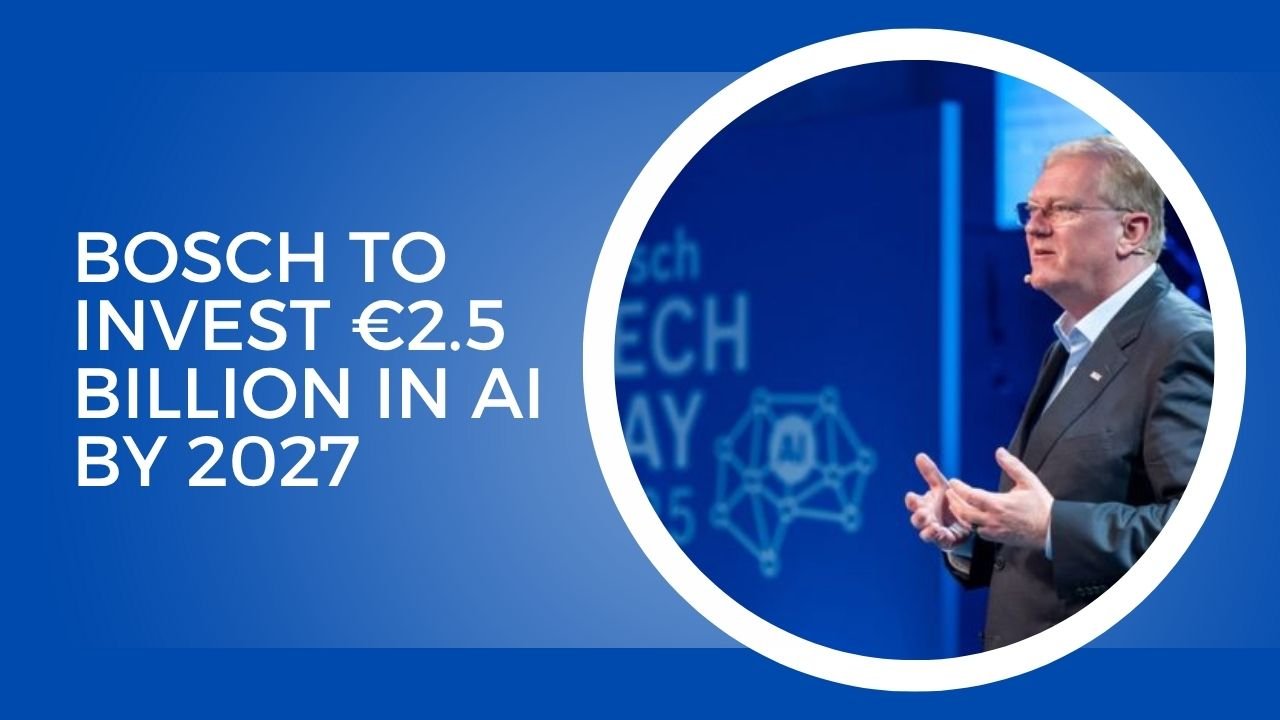Why Bosch Is Going All-In on AI
Bosch isn’t just dipping its toes into artificial intelligence—it’s diving in headfirst. The German tech giant has announced a whopping €2.5 billion investment in AI by 2027, aiming to revolutionize everything from self-driving cars to smart factories and even the gadgets we use at home. But why such a massive commitment? Simple: Bosch believes AI isn’t just the future—it’s the key to staying ahead in a fast-moving tech race.
With over 1,500 AI-related patents filed in the last five years, Bosch is already a major player in the field. Now, it’s doubling down to make sure it doesn’t get left behind by competitors in the U.S. and China. As CEO Stefan Hartung puts it, AI is a “fundamental innovation booster” that will help Bosch turn cutting-edge tech into real-world business opportunities.
Self-Driving Cars: Smarter, Safer, and Sooner Than You Think
One of Bosch’s biggest AI bets is on automated and assisted driving. Imagine a car that doesn’t just follow GPS directions but actually understands its surroundings—predicting what other drivers might do, adjusting routes in real time, and even spotting hazards before they become a problem. That’s exactly what Bosch is working on.
Thanks to AI-powered sensors, software, and high-performance computing, Bosch expects its mobility solutions to bring in over €10 billion a year by 2035. That’s not just fancy tech—it’s a game-changer for safety. Fewer accidents, smoother traffic, and maybe even a future where you can kick back and let your car do the driving.
The Factory of the Future: AI That Fixes Itself
Ever had a machine break down at the worst possible time? Bosch is solving that headache with something called “agentic AI.” These smart systems don’t just run machines—they monitor them, predict when they’ll need maintenance, and even adjust workflows to keep things running smoothly.
The results? Fewer unexpected shutdowns, higher productivity, and less wasted time. And here’s the kicker: Bosch isn’t keeping this tech to itself. By late 2025, the company plans to release an AI platform that lets other businesses set up their own self-optimizing factories—no coding PhD required.
AI in Your Home: Making Life Easier (Without You Noticing)
Bosch isn’t just focusing on cars and factories—it’s also bringing AI into everyday life. Think appliances that learn your habits, energy systems that cut costs automatically, and tools that make work easier without needing constant input. The goal? Smarter living with less effort.
While Bosch hasn’t spilled all the details yet, expect AI to quietly improve everything from your morning coffee routine to how your home manages energy. The less you have to think about it, the better it’s working.
The Big Challenge: Europe’s AI Regulations
There’s just one problem: regulation. Bosch’s CEO has warned that if Europe clamps down too hard on AI, it could fall behind the U.S. and China. Hartung isn’t against rules—he just wants them to focus on real risks without strangling innovation.
The fear? Overregulation could slow down breakthroughs, making it harder for European companies to compete globally. Bosch’s message is clear: AI is too important to get bogged down in red tape.
What’s Next for Bosch—and for Us?
Bosch’s €2.5 billion AI push isn’t just about staying competitive—it’s about shaping the future. From safer roads to factories that run themselves and homes that adapt to our needs, the company is betting big on AI to make life smoother, smarter, and more efficient.
The real question is: How soon will we see these changes in our daily lives? If Bosch has its way, the future might arrive faster than we think.
Bosch’s AI Investment at a Glance
| Area | Key Focus | Expected Impact |
| Automated Driving | AI-powered sensors, route planning, and hazard prediction | €10 billion+ annual sales by 2035; safer, more reliable self-driving tech |
| Smart Factories | “Agentic AI” for self-monitoring machines and optimized workflows | Fewer breakdowns, higher productivity; platform for other businesses by late 2025 |
| Consumer Products | Smarter appliances, energy systems, and tools | More intuitive, energy-efficient homes and workplaces |
| Regulation | Advocating for balanced AI rules in Europe | Pushing for innovation-friendly policies to compete globally |
Final Thoughts
Bosch’s massive AI investment isn’t just a corporate strategy—it’s a glimpse into a future where tech works for us, not the other way around. Whether it’s cars, factories, or everyday gadgets, AI is set to make life easier, safer, and more efficient. The only question left is: Are we ready for it?

